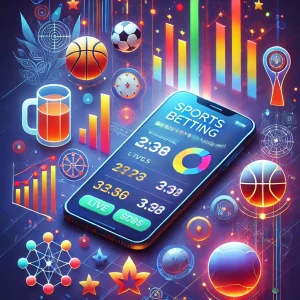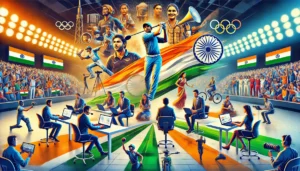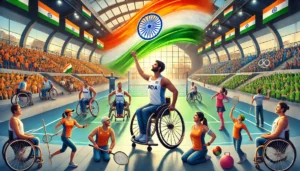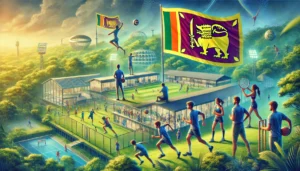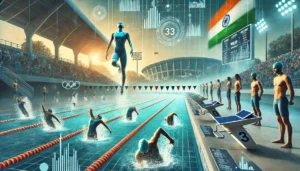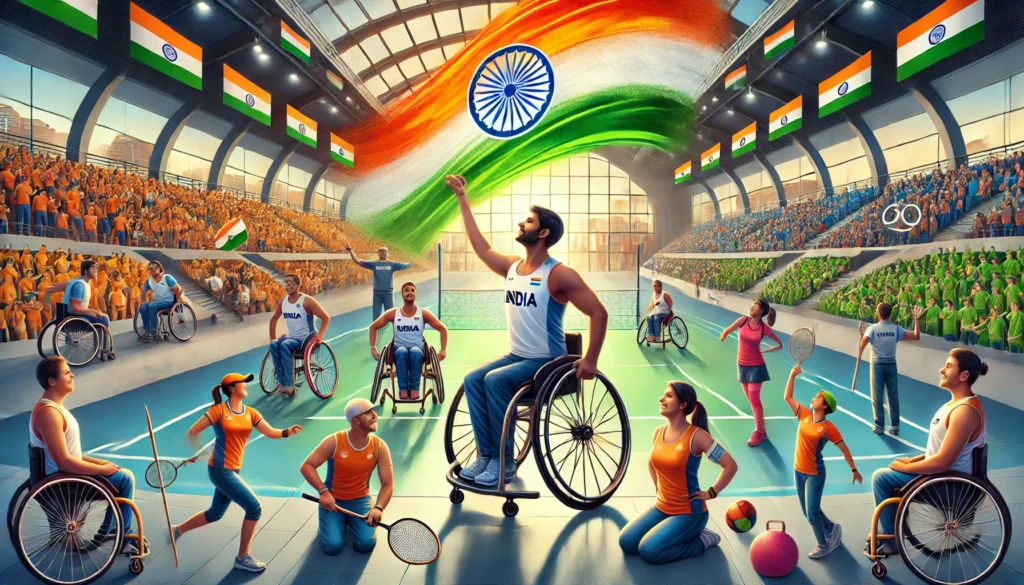
The world of para-athletes in India is one of resilience, determination, and the relentless pursuit of excellence. Para-sports in India have gradually gained recognition over the years, with athletes breaking barriers and bringing glory to the nation on international stages. These athletes, who compete with physical and mental challenges, have proven that limitations can be overcome with the right support and determination. The journey of para-athletes is not only a testament to individual strength but also a reflection of the broader societal changes happening in India, where there is growing acceptance and encouragement for people with disabilities to participate in sports. As para-sports become more prominent, the stories of these athletes inspire millions across the country, fostering a spirit of inclusion and equality. However, despite the achievements and progress, para-athletes in India still face numerous challenges that must be addressed to ensure that they receive the same opportunities and recognition as their able-bodied counterparts. Understanding these challenges and the support mechanisms available is crucial to further nurturing the talents of para-athletes and creating a truly inclusive sporting environment in India.
Challenges Faced by Para-athletes in India
Para-athletes in India face a unique set of challenges that can hinder their ability to train, compete, and reach their full potential. These challenges range from infrastructural barriers to social perceptions, all of which require comprehensive solutions to create an equitable playing field for these athletes.
Accessibility and Infrastructure Issues
One of the major challenges for para-athletes in India is the lack of accessible infrastructure and facilities. Many sports complexes and training centers are not designed to accommodate athletes with physical disabilities, making it difficult for them to access necessary training spaces. The availability of specialized equipment, such as prosthetics or customized wheelchairs for specific sports, is also limited. This lack of proper infrastructure means that para-athletes often have to travel long distances to find facilities that meet their needs, which can be both time-consuming and costly. Improving accessibility and building more inclusive sports facilities are essential steps toward leveling the playing field for para-athletes in India.
Social Stigma and Lack of Awareness
Social attitudes towards disability can be a significant hurdle for para-athletes in India. There remains a lack of understanding and awareness about the capabilities of people with disabilities, leading to misconceptions and stereotypes. This social stigma can discourage potential athletes from pursuing sports, as they may not receive the support and encouragement needed from their communities or families. Additionally, the visibility of para-sports in mainstream media is relatively low, which means that the achievements of para-athletes often go unrecognized. Increasing media coverage and promoting positive stories of para-athletes can play a crucial role in changing public perceptions and inspiring more people to take up para-sports.
Financial Constraints and Limited Sponsorships
Financial challenges are another significant obstacle for para-athletes in India. Unlike their able-bodied counterparts, para-athletes often find it difficult to secure sponsorships and funding for their training and competitions. This financial burden can limit their access to quality coaching, specialized equipment, and opportunities to participate in international events. While government schemes provide some level of support, it is often not enough to cover all the expenses required for high-level competition. As a result, many talented para-athletes are unable to fully realize their potential due to a lack of resources. Encouraging more corporate sponsorships and creating targeted financial support programs for para-athletes could help alleviate these challenges.
Addressing these challenges is key to ensuring that para-athletes in India have the opportunity to succeed and showcase their talents on the global stage. By improving infrastructure, raising awareness, and providing financial support, India can create a more inclusive environment that nurtures the next generation of para-athletes.
Government Support and Initiatives for Para-athletes
In response to the challenges faced by para-athletes, the Indian government has implemented several initiatives to support and promote para-sports. These initiatives aim to provide better training opportunities, financial aid, and platforms for para-athletes to compete and excel in their respective sports.
- Schemes like the Para Sports Federation of India: The Para Sports Federation of India (PSFI) is a key organization that works closely with the government to promote para-sports at various levels. The federation plays a significant role in organizing national championships and trials for international events such as the Paralympics. It also collaborates with state bodies to identify talent and provide them with necessary resources. Through the PSFI, para-athletes have access to structured competitions that help them gain exposure and experience.
- Khelo India and Paralympic Programs: The Khelo India initiative, which aims to promote sports culture at the grassroots level, has also expanded its reach to include para-athletes. Under this program, para-athletes are provided with opportunities to compete in national events, receive scholarships, and access specialized training camps. These initiatives ensure that talented athletes from diverse backgrounds, including those with disabilities, receive the support they need to develop their skills. The government also organizes special training camps for athletes preparing for the Paralympic Games, providing them with world-class coaching and facilities.
- Financial Assistance and Scholarships: To ease the financial burden on para-athletes, the government offers scholarships and grants through various programs such as the Target Olympic Podium Scheme (TOPS) and the National Sports Development Fund (NSDF). These schemes are designed to provide financial aid for training, travel, and participation in international competitions. The support helps athletes focus on their preparation without worrying about the costs associated with competing at the highest levels. Additionally, initiatives like the Maulana Abul Kalam Azad Trophy have been introduced to recognize and reward achievements in sports, including para-sports, providing further incentives for athletes.
These government efforts have been instrumental in raising the profile of para-sports in India, helping para-athletes gain recognition and opportunities to compete at an international level. Continued investment in these programs is crucial for the sustained growth and success of para-athletes in the country.
Top 5 Indian Para-athletes Who Made a Mark Globally
India has produced several exceptional para-athletes who have not only excelled in their respective sports but have also become symbols of resilience and determination. Their achievements on the international stage have brought pride to the nation and have inspired countless others to pursue sports despite their physical challenges. Here are five para-athletes whose contributions have left a lasting impact:
- Devendra Jhajharia
Devendra Jhajharia is one of India’s most celebrated para-athletes, having won gold medals in javelin throw at the 2004 Athens Paralympics and the 2016 Rio Paralympics. His determination to overcome challenges and set world records has made him a role model for aspiring para-athletes across the country. - Mariyappan Thangavelu
Mariyappan Thangavelu won gold in the men’s high jump T-42 event at the 2016 Rio Paralympics, showcasing his exceptional talent and dedication. His victory brought global recognition to India’s para-sports community, and he has since become a prominent advocate for the rights of people with disabilities in sports. - Deepa Malik
Deepa Malik became the first Indian woman to win a medal in the Paralympic Games, earning silver in the shot put at the 2016 Rio Paralympics. Her achievements have broken barriers and have been a source of inspiration for women in para-sports, encouraging them to pursue competitive athletics. - Manish Narwal
Manish Narwal is a young shooting sensation who won gold in the 50m pistol event at the Tokyo 2020 Paralympics. His precision and focus have made him one of India’s most promising para-shooters, demonstrating that age is no barrier to achieving greatness in sports. - Bhavina Patel
Bhavina Patel made history by winning a silver medal in table tennis at the Tokyo 2020 Paralympics, becoming the first Indian para-paddler to achieve this feat. Her success has brought attention to para-table tennis in India and has highlighted the potential of Indian athletes in lesser-known sports.
These para-athletes have not only brought glory to India but have also shown that with perseverance and support, individuals can overcome any obstacle. Their stories continue to inspire the nation and contribute to the growing recognition of para-sports in India.
The Role of Non-Governmental Organizations and Private Sponsors
The development of para-sports in India is greatly supported by the efforts of non-governmental organizations (NGOs) and private sponsors. These entities play a crucial role in providing resources, raising awareness, and creating opportunities for para-athletes to pursue their passion.
Promoting Grassroots Development
Many NGOs focus on grassroots development, working in local communities to identify and nurture talent among people with disabilities. These organizations often conduct training camps, workshops, and local competitions that help para-athletes gain foundational skills and confidence. By engaging with schools and community centers, NGOs can reach out to young talent who might otherwise go unnoticed. These grassroots efforts are essential for expanding the pool of para-athletes and ensuring that talent is not limited to metropolitan areas.
Training Facilities and Coaching Support
Private organizations and sponsors have also stepped in to provide access to specialized training facilities and coaching support. By partnering with professional trainers and international sports academies, these sponsors help para-athletes receive the same level of training as their able-bodied counterparts. For example, several companies have sponsored the development of high-tech prosthetics and adaptive equipment, allowing para-athletes to compete with the best in the world. Such investments help bridge the gap between available resources and the needs of para-athletes.
Awareness Campaigns and Publicity
Awareness campaigns run by NGOs and private sponsors play a critical role in changing societal perceptions about people with disabilities. These campaigns often use social media, television, and public events to showcase the achievements of para-athletes, bringing their stories to a wider audience. By highlighting the determination and success of these athletes, such campaigns help to challenge stereotypes and create a more inclusive sports culture in India. The increased visibility also attracts more sponsors, creating a positive cycle of support for para-sports.
Together, the efforts of NGOs, private sponsors, and the media help to provide para-athletes with the recognition and resources they need to succeed. Their role is essential in building a sustainable ecosystem for para-sports in India.
Building a Stronger Swimming Culture in India
To create a vibrant swimming culture in India, it is crucial to focus on a holistic approach that encompasses training, community engagement, and the development of competitive platforms. Building this culture requires efforts at various levels, from grassroots participation to professional coaching and national-level competitions.
Grassroots Development and Early Exposure: Introducing swimming programs in schools and community centers is essential to encourage young children to take up the sport. Grassroots initiatives can help identify talent at an early age and ensure that children from diverse backgrounds have the opportunity to learn swimming. These programs can also foster a love for the sport, laying a strong foundation for future athletes.
Developing Competitive Pathways: Establishing a clear pathway for swimmers to progress from local competitions to state and national levels is crucial for sustaining interest and motivating young athletes. This involves organizing regular competitions, creating age-group events, and ensuring that talented swimmers receive the support needed to compete on larger stages.
Promoting Awareness and Role Models: Creating awareness about the benefits of swimming for health and fitness can also play a role in building a culture of swimming. Highlighting success stories and achievements of Indian swimmers can inspire more people to take up the sport. Media coverage, social media campaigns, and community events can all contribute to promoting swimming as a valuable and rewarding sport in India.
By focusing on these aspects, India can create a strong and inclusive swimming culture that encourages participation, supports talent development, and ensures that swimmers have the opportunity to reach their full potential.


